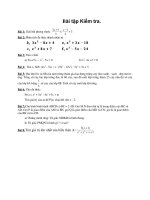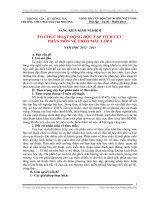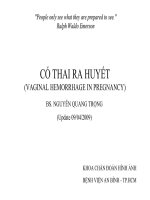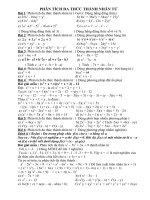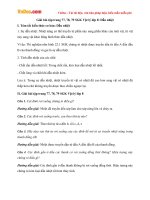Bài tập tiếng Anh cấu trúc Enough to V
Bạn đang xem bản rút gọn của tài liệu. Xem và tải ngay bản đầy đủ của tài liệu tại đây (59.31 KB, 7 trang )
BÀI TẬP CẤU TRÚC ENOUGH TO V
Cấu trúc Enough to V là một trong những cấu trúc ngữ pháp tiếng Anh không thể
thiếu khi học. Trong bài viết này, Download.vn muốn đề cập đến cấu trúc Enough trong
tiếng Anh như: Enough là gì, cấu trúc Enough như thế nào,.. và nhiều dạng bài tập tiếng Anh
khác nhau giúp bạn đọc vận dụng kiến thức đã học hiệu quả.
A. Lý thuyết cấu trúc Enough
1. Enough là gì?
Enough trong tiếng Anh có nghĩa là đủ tuy nhiên đôi khi “enough” được sử dụng với nhiều
mục đích khác nhau do trong mỗi hồn cảnh ý nghĩa “đủ” của nó cũng khác nhau. “Enough”
có thể được sử dụng để chỉ số lượng hay kích cỡ của một sự vật nào đó có vừa khơng, có đủ
khơng.
Ví dụ:
– I don’t have enough money to buy this skirt
– She is intelligent enough to solve that problem
2. Cấu trúc với từ Enough
a, Cấu trúc enough dạng khẳng định
“Enough” được sử dụng sau tính từ và trạng từ kết hợp với nó là động từ nguyên thể có “to”
– S + tobe + adj + enough + (for SB) + to V nguyên thể
– S + V + adv + enough + (for SB) + to V nguyên thể
Ví dụ:
+ The weather is beautiful enough to have a picnic
+ I am tall enough to take a book on the top of shelf
+ My hair has long enough to tie
b, Cấu trúc enough dạng phủ định:
– S + tobe not + adj + enough + (for SB) + to V nguyên thể
– S + don’t/doesn’t/didn’t +V + adv + enough + (for SB) + to V nguyên thể
Ví dụ:
+ He isn’t strong enough to lift this box
+ I am not hardworking enough to do homework
+ She isn’t tall enough to become a model
c, Cấu trúc enough với danh từ
Khi “Enough” kết hợp với danh từ thì “enough” đứng trước danh từ
S + V + enough + noun + (for SB) + to V nguyên thể
Ví dụ:
+ He doesn’t have enough time to fix his car
+ This car doesn’t have enough seat for 6 people
+ I don’t have enough money to buy car
3. Quy tắc cần nhớ khi dùng Enough
Quy tắc 1:
Nếu:
– Trước tính từ, trạng từ trong câu có các trạng từ: too, so, very, quite, extremely…
– Trước danh từ có many, much, a lot of, lots of
=> Thì phải bỏ
Ví dụ:
+ She is very tall. She can become a model => She is very tall enough to become a model
(SAI) => She is tall enough to become a model
Quy tắc 2:
Khi nối câu bằng “enough", nếu chủ ngữ ở 2 câu giống nhau thì lược bỏ “for sb”
Ví dụ:
+ Helen is intelligent. Helen can become a teacher => Helen is intelligent enough for her to
become a teacher (SAI) => Helen is intelligent enough to become a teacher
* Tuy nhiên nếu chủ từ câu sau có ý chung chung thì cũng có thể bỏ đi
Ví dụ: The weather is warm. We can live on it. -> The weather is warm enough to live on.
(we ở đây chỉ chung chung, mọi người)
Quy tắc 3:
Khi nối câu bằng “enough”, nếu chủ ngữ của câu thứ nhất trùng với tân ngữ của câu 2 (là
một) thì khi ghép 2 câu ta loại bỏ phần tân ngữ của câu sau
Ví dụ:
+ The water is quite cold. I can’t drink it. -> The water isn’t warm enough for me to drink it.
(SAI) -> The water isn’t warm enough for me to drink.
B. Bài tập vận dụng
I. Use ENOUGH and one word from the box to complete each sentence.
Adjectives: big, old, warm, well
Nouns: cups, milk, money, qualifications, time, room
1. She shouldn’t get married. She’s not .......................
2. I’d like to bye a car but I haven’t got .......................
3. Have you got ....................... in your tea or would you like some more ?
4. Are you ....................... ? Or shall I swish on the heating ?
5. It’s only a small car. There isn’t ....................... for all of you.
6. Steve didn’t feel ....................... to go to work this morning.
7. I didn’t answer all the questions in the exam. I didn’t have .......................
8. Do you think I’ve got .............................................. to apply for the job ?
9. Try this jacket on to see if it’s ....................... for you.
10. There weren’t ....................... for everybody to have coffee at the same time.
warm, time, fast, long, money, information, tall, people
1. I can’t give you an answer because I don’t have .........................................
2. I couldn’t run .......................
3. The ladder wasn’t ....................... to reach the window.
4. There aren’t ....................... to make a club of stamps collectors.
5. Do you have ....................... to buy her a present?
6. The pants weren’t ....................... to fit my brother.
7. The weather isn’t ....................... for us to go swimming.
8. Did you have ....................... to answer all the questions in the test?
II. Combine each pair of sentences, using ENOUGH .... TO.V or ENOUGH FOR ....
TO.V
1. The moon is very bright. We can play outdoors.
2. I have enough money. I can pay this bill.
3. My sister is old. She can drive a car.
4. The weather was fine. We could go camping.
5. This coat isn’t rich. I don’t wear it in winter.
6. Robinson isn’t rich. He can’t buy a house.
7. He wasn’t very experienced. He couldn't do the job.
8. You aren’t old. You can’t have a front– door key.
9. He didn’t have much money. He couldn’t live on it.
10. The buffalo isn’t big. He can’t harm you.
11. The ice is quite thick. We can’t walk on it.
12. The tea isn’t strong. It won’t keep us awake.
13. This novel is interesting. We can read it.
14. We thick you are strong enough. You can lift this table.
15. This kind of rubber is good. We can use it to make tiresfor car.
16. He has no time. He can’t finish this word.
17. My frind is quite well. She can do it again.
18. She doesn’t explain this exercise. He pupils can’t do it.
19. There isn’t enough time. This students can’t write this essay.
20. It’s warm tonight. We can go out.
21. These exercises are easy. You can do them.
22. Those oranges are ripe. We can eat them.
23. My sister wasn’t well. She didn’t go to work.
24. The book is small. I can put it in my pocket.
25. The boy is tall. He can reach the top shelf.
26. Those shoes are large. You can wear them.
27. Your brother was clever. He could do this exercise in a few minutes.
28. We weren’t early. We couldn’t see the first part of the play.
29. She has much money. She can buy that dictionary.
30. The children were very eager. They started playing without me.
31. She isn’t old. She can’t get married yet.
32. That coat isn’t warm. I can’t stand on that chair.
33. That chair isn’t strong. He can’t wear it in winter.
34. Are you very tall? Can you reach the book on the top shelf?
35. This bed isn’t wide. Two people can’t sleep on this bed.
36. That box is light.I couldn’t eat breakfast this morning.
37. Three people can’t sit on this sofa. It isn’t wide enough.
38. The floor wasn’t strong. We couldn’t dance on it.
39. You aren’t very old. You can’t understand it.
40. He is sick. He needs a doctor.
41. The book is small. I can put it in my pocket.
42. Brown isn’t rich. He can’t buy a car.
43. Those shoes are large. You can wear them.
44. Your sister was clever.. She could do this exercise in a few minutes.
45. The air is fresh. We can have some holidays there.
46. Peter is very ill. He must see the docker.
47. Mary isn’t old. She can’t do that work.
48. We weren’t early. We couldn’t see the first part of the play.
49. She has much money. She can buy that dictionary.
50. The children were very eager.They started playing without me.
III. Combine each pair of sentences, using “ENOUGH”.
1. The moon is bright. I can read a book by it.
2. I have enough money. I can pay this bill.
3. These rubber trees are big.They can give us milky liquid.
4. This novel is interesting. We can read it.
5. This kind of rubber is good. We can use it to make tiresfor cars.
6. We think you are very strong. You can lift this table.
7. He has no time. He can’t finish this work.
8. My friend is quite well. She can work again.
9. There isn’t enough time. The pupils can’t write this essay.
10. She doesn’t explain this exercise clearly. Her pupils can’t do it.
IV. Combine these sentences, using enough.
1. She’s not old. She can’t get married yet.
2. This cost isn’t strong. I can’t wear it in winter.
3. That chair isn’t strong. We can’t stand on that chair.
4. Are you very tall? Can you read the top shelf?
5. It’s not warm today. We can’t go outside.
6. I’m not strong. I can’t lift this box.
7. Tom doesn’t have money. He can’t pay his bills.
8. This bed isn’t wide. Two people can’t sleep in the bed.
9. The water wasn’t clean. We couldn’t swim in it.
10. He wasn’t experienced. He can’t do that job.
11. I don’t have money. I can’t lend you some.
12. He is hungry. He can eat 3 sandwiches.
13. Peter isn’t tired. He can’t stay at home alone.
14. This seat isn’t wide. We can’t sit on it.
15. Susan isn’t old. She can’t stay at home alone.
16. That box is light. She can lift it.
17. I didn’t have time. I can eat breakfast this morning.
18. This shirt is big. He can wear it.
19. Mary doesn’t have money. She can’t buy a new bicycle.
20. It’t warm tonight. We can go out.
